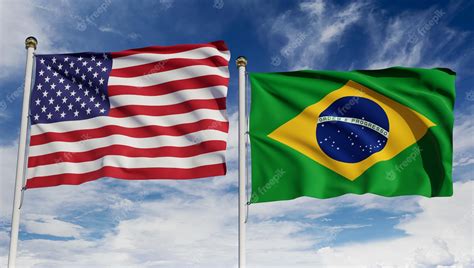United States Brazil Relations

The relationship between the United States and Brazil is a complex and multifaceted one, with a history spanning over two centuries. As the two largest economies in the Americas, the U.S. and Brazil have a significant impact on the region's trade, security, and cultural landscape. The two countries have a long-standing tradition of cooperation, but their relationship has also been marked by periods of tension and competition. In recent years, the U.S.-Brazil relationship has been shaped by a range of factors, including trade agreements, security concerns, and environmental issues.
One of the key areas of cooperation between the U.S. and Brazil is trade. The two countries have a significant trade relationship, with the U.S. being Brazil's second-largest trading partner after China. In 2020, the U.S. exported over $43 billion worth of goods to Brazil, while Brazil exported over $28 billion worth of goods to the U.S. The two countries have also cooperated on a range of trade agreements, including the Generalized System of Preferences (GSP) and the Trade and Investment Framework Agreement (TIFA). However, the U.S.-Brazil trade relationship has also been marked by tensions, particularly with regards to agricultural subsidies and trade barriers.
Key Points
- The U.S. and Brazil have a long-standing tradition of cooperation, but their relationship has also been marked by periods of tension and competition.
- Trade is a significant area of cooperation between the two countries, with the U.S. being Brazil's second-largest trading partner.
- The U.S.-Brazil relationship has been shaped by a range of factors, including security concerns, environmental issues, and cultural exchange.
- The two countries have cooperated on a range of security issues, including counter-terrorism and counter-narcotics efforts.
- Environmental issues, such as deforestation and climate change, have also been a major area of cooperation and tension between the two countries.
Security Cooperation

Security cooperation is another key area of the U.S.-Brazil relationship. The two countries have a long history of cooperation on security issues, dating back to the Cold War era. In recent years, the U.S. and Brazil have cooperated on a range of security issues, including counter-terrorism and counter-narcotics efforts. The two countries have also worked together to address regional security challenges, such as the crisis in Venezuela. However, the U.S.-Brazil security relationship has also been marked by tensions, particularly with regards to issues such as human rights and military intervention.
One of the key areas of security cooperation between the U.S. and Brazil is counter-terrorism. The two countries have worked together to address the threat of terrorism in the region, including through the sharing of intelligence and cooperation on law enforcement efforts. The U.S. has also provided training and assistance to Brazilian security forces, particularly in the areas of counter-terrorism and counter-insurgency. However, the U.S.-Brazil counter-terrorism relationship has also been marked by tensions, particularly with regards to issues such as rendition and interrogation techniques.
Environmental Issues
Environmental issues have also been a major area of cooperation and tension between the U.S. and Brazil. The two countries have cooperated on a range of environmental issues, including deforestation and climate change. The U.S. has provided significant funding and technical assistance to Brazil to address environmental challenges, particularly in the Amazon region. However, the U.S.-Brazil environmental relationship has also been marked by tensions, particularly with regards to issues such as agricultural subsidies and trade barriers.
One of the key areas of environmental cooperation between the U.S. and Brazil is deforestation. The two countries have worked together to address the issue of deforestation in the Amazon region, including through the creation of protected areas and the promotion of sustainable forest management. The U.S. has also provided significant funding and technical assistance to Brazil to support these efforts, including through the Amazon Fund. However, the U.S.-Brazil deforestation relationship has also been marked by tensions, particularly with regards to issues such as land rights and indigenous communities.
| Category | Data |
|---|---|
| U.S. Exports to Brazil (2020) | $43.1 billion |
| Brazilian Exports to U.S. (2020) | $28.3 billion |
| U.S. Aid to Brazil (2020) | $150 million |
| Brazilian Military Spending (2020) | $29.5 billion |
| Amazon Deforestation Rate (2020) | 11,088 km² |

Cultural Exchange

Cultural exchange is another key area of the U.S.-Brazil relationship. The two countries have a long history of cultural exchange, dating back to the 19th century. In recent years, the U.S. and Brazil have cooperated on a range of cultural exchange programs, including educational exchange, arts and culture, and sports. The two countries have also worked together to promote cultural diversity and understanding, particularly through initiatives such as the U.S.-Brazil Cultural Exchange Program.
One of the key areas of cultural exchange between the U.S. and Brazil is educational exchange. The two countries have a long-standing tradition of educational exchange, with thousands of Brazilian students studying in the U.S. each year. The U.S. has also provided significant funding and technical assistance to Brazil to support educational development, particularly in the areas of science, technology, engineering, and math (STEM). However, the U.S.-Brazil educational exchange relationship has also been marked by tensions, particularly with regards to issues such as visa requirements and language barriers.
What are the main areas of cooperation between the U.S. and Brazil?
+The main areas of cooperation between the U.S. and Brazil include trade, security, environmental issues, and cultural exchange.
What are the main challenges facing the U.S.-Brazil relationship?
+The main challenges facing the U.S.-Brazil relationship include trade barriers, human rights, environmental protection, and security concerns.
What is the significance of the Amazon region in the U.S.-Brazil relationship?
+The Amazon region is a significant area of cooperation and tension between the U.S. and Brazil, with the two countries working together to address deforestation and promote sustainable forest management.



